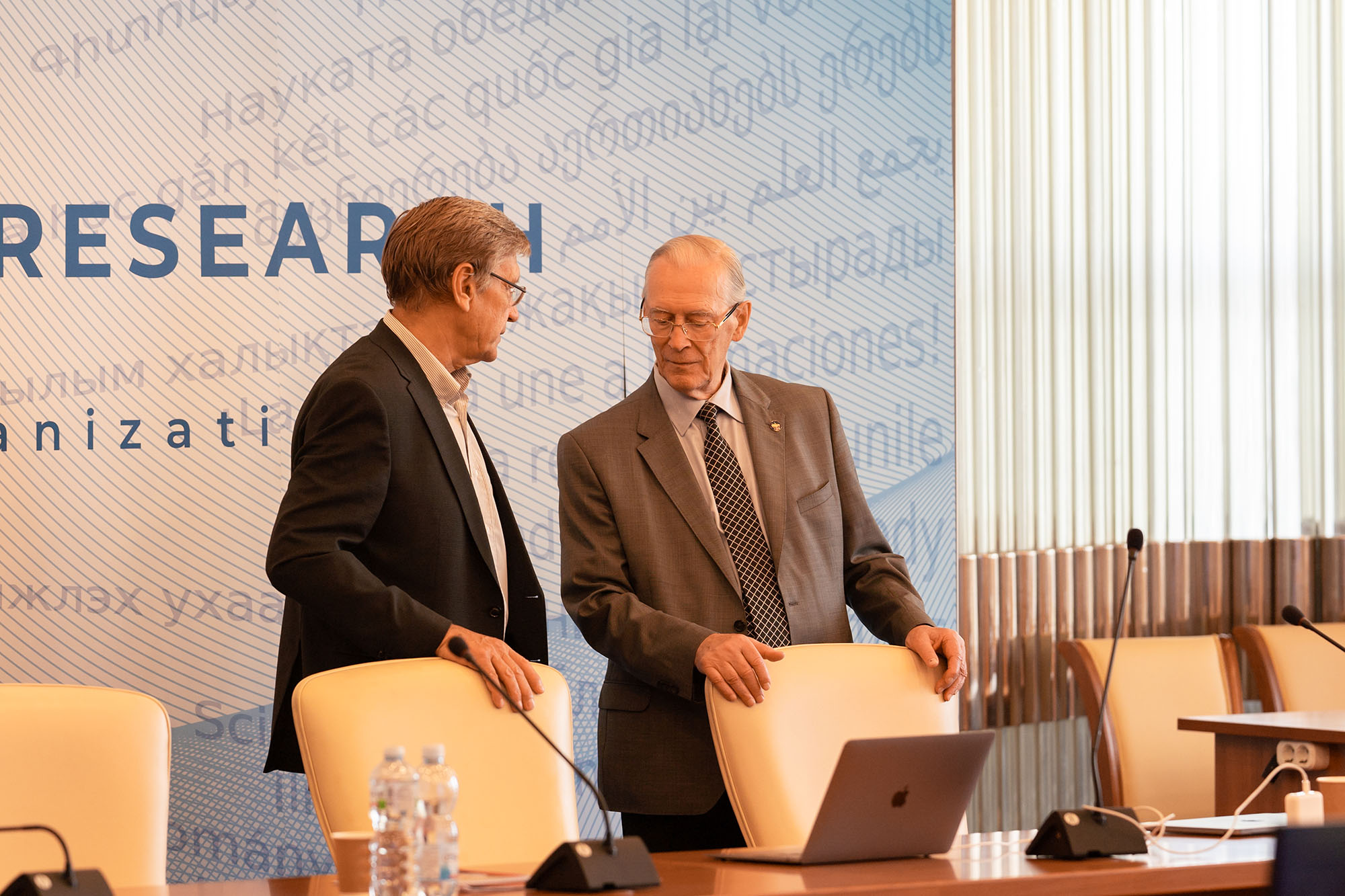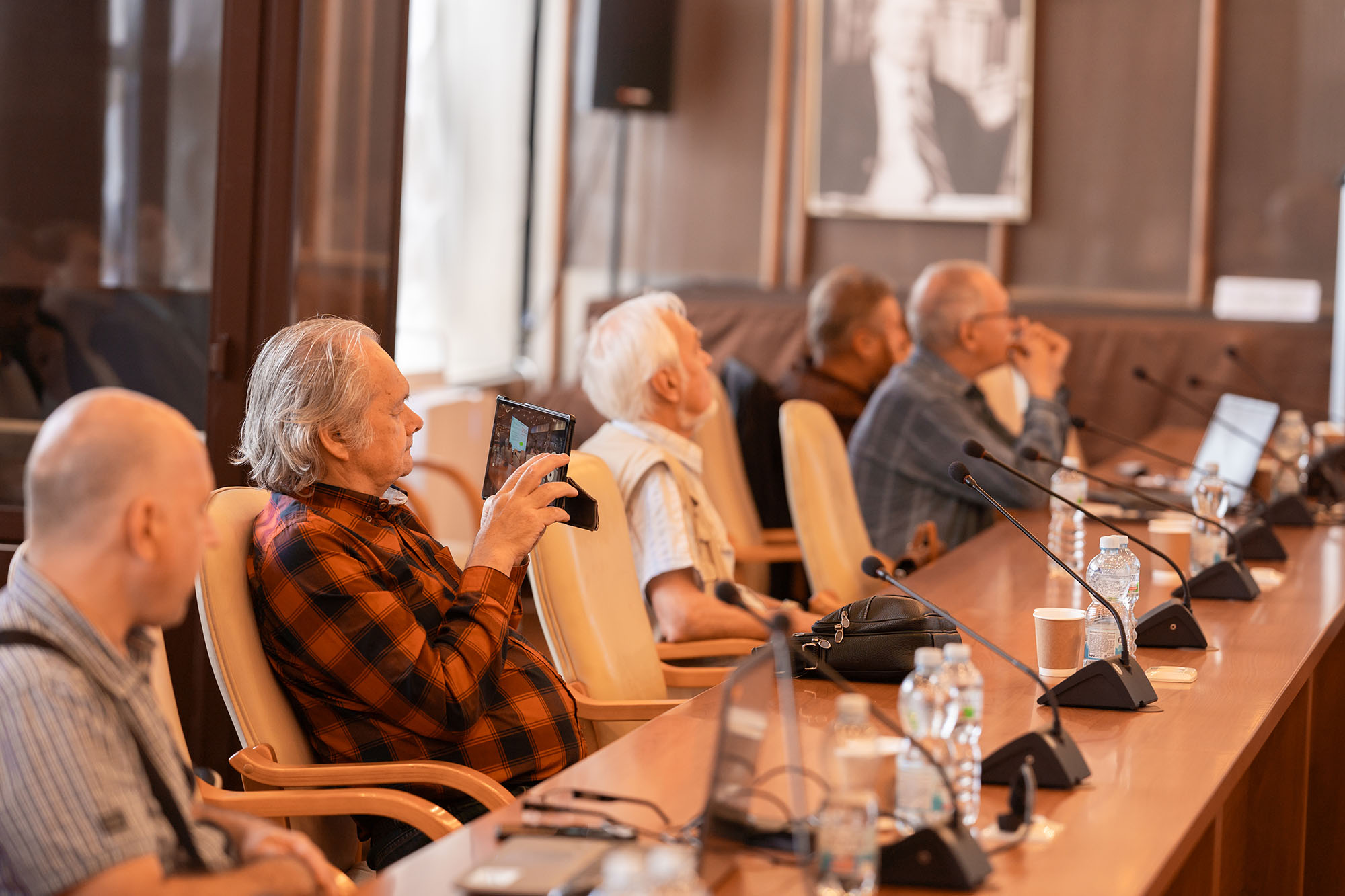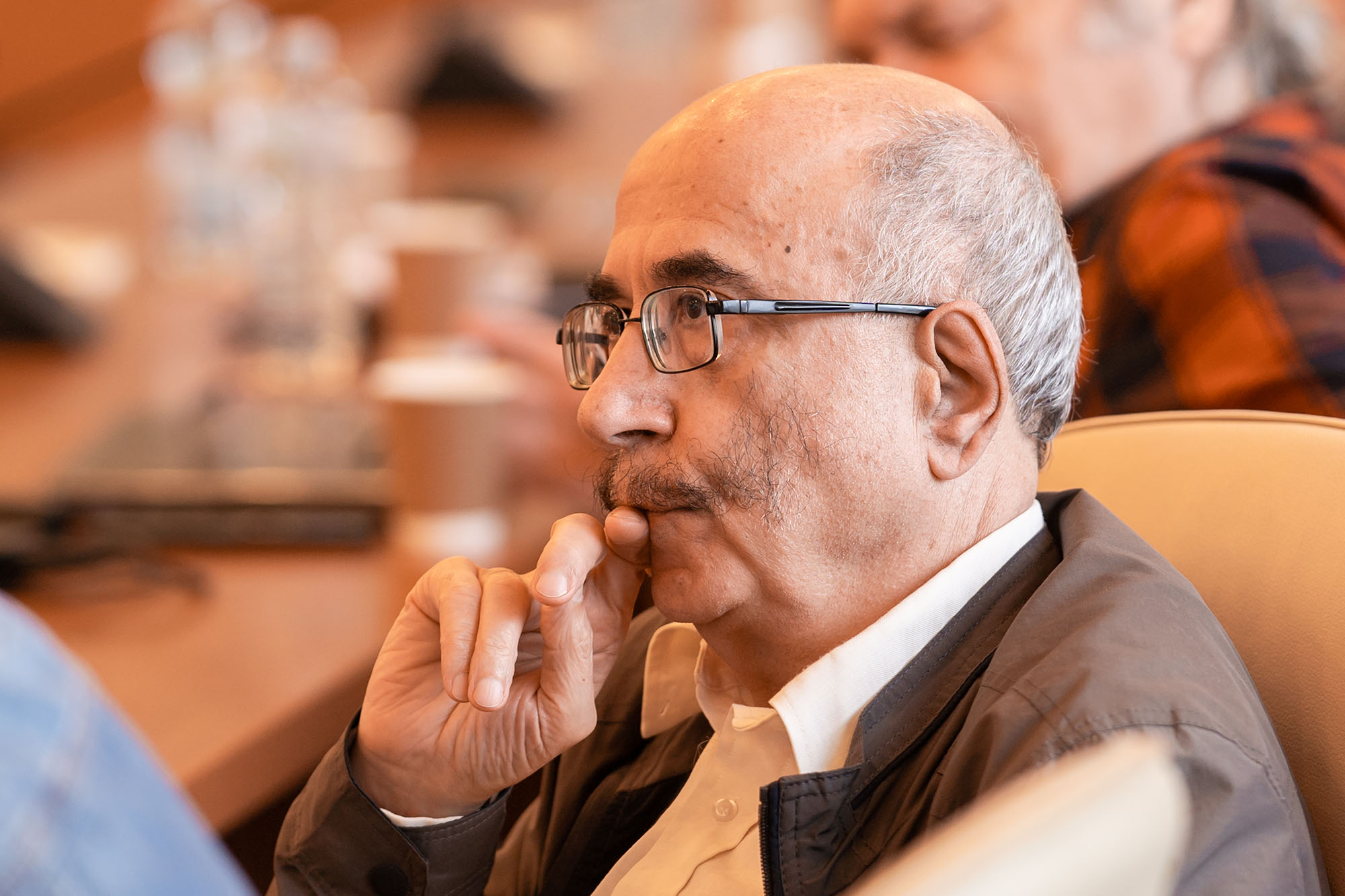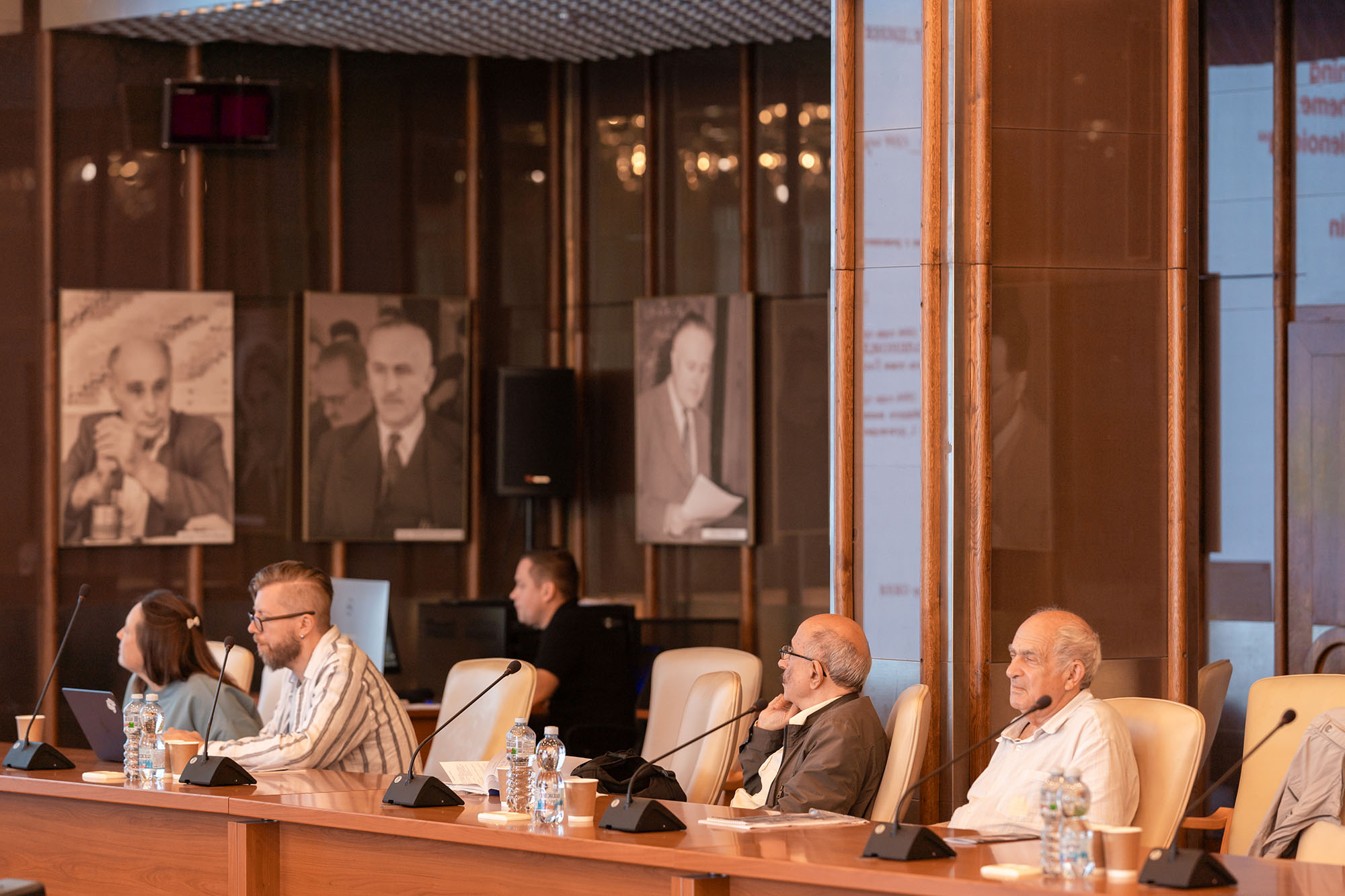JINR hosts seminar in memory of Igor Golutvin
News, 11 August 2024
On 8 August, the International Seminar entitled “Experimental Methods in Particle Physics” took place at the International Conference Centre of the Joint Institute for Nuclear Research in memory of Doctor of Physics and Mathematics, Professor Igor Golutvin. The event was timed to coincide with the 90th anniversary of the birth of this outstanding researcher, Scientific Leader of the CMS Experiment at LHC (CERN) at the Joint Institute, Honoured Scientist of the Russian Federation. More than 100 researchers took part in discussing topical issues of the development of modern particle physics experiments.
JINR Scientific Leader, Academician of the Russian Academy of Sciences Victor Matveev opened the seminar, discussing the key stages of Igor Golutvin’s academic career and his significant contribution to world science. “During his work at the Joint Institute, he created a scientific school and educated a team of active qualified physicists and engineers, whose works are widely recognised all over the world,” JINR Scientific Leader noted.
The second part of his speech was devoted to the history of the creation and prospects of the RDMS CMS (Russia and Dubna Member States CMS Collaboration), which unites about 300 researchers from Russia and the JINR Member States. The collaboration, founded under the scientific leadership of Igor Golutvin, not only preserved the developing scientific schools and unique teams of physicists and engineers, but also created favourable conditions for attracting promising young physicists to the CMS (Compact Muon Solenoid) Experiment at the Large Hadron Collider at CERN.
“Igor Golutvin was highly determined and principled,— Victor Matveev said. — He appreciated his younger colleagues incredibly and sincerely wished them great scientific achievements. I am glad that his students remain faithful to their teacher and are willing to preserve and share the memory of him with the next generation. Igor Golutvin had a talent for uniting people to solve difficult tasks, which resulted in multiple outstanding discoveries.”
Head of the VBLHEP JINR Scientific and Experimental Physics Department at CMS Vladimir Karzhavin read out a letter from outstanding CERN scientists Tejinder Virdi, Michel Della Negra, and Nicholas Kulberg, who shared their memories of Igor Golutvin during his work in Europe. “Igor Golutvin was one of the pioneers of the long and prolific collaboration between CERN, Dubna, and the Russian institutes. He was adopted by CERN’ supportive and convivial community in a spirit of openness and solidarity. It was here that his taste for scientific adventure was formed, and the ideas of developing ever more efficient detectors were born. The CMS Collaboration remembers Igor Golutvin as a great physicist, leader, and friend,” the letter says.
Andrey I. Golutvin, Doctor of Physics and Mathematics, Professor at Imperial College London, shared his memories of how his father influenced his scientific work and career. In addition, he presented plans for the development of the SHiP (Search for Hidden Particles) Project, aimed at searching for weakly interacting long-lived particles, including heavy neutral leptons and light supersymmetric particles, emphasising that this project is a continuation of his father’s scientific legacy.
Professor at the University of Pisa (Italy) Guido Tonelli delivered a report “Shoulder by shoulder with Igor Golutvin: the journey toward the discovery of the Higgs boson” The Italian scientist, one of the discoverers of the new elementary particle, spoke in detail about how the research that led to the discovery of the Higgs boson began, and what role Igor Golutvin played in it. “He was a real maestro of science,” Guido Tonelli summed up.
Chairman of the European Committee for Future Accelerators (ECFA) Paraskevas Sphicas discussed the past, present, and future of particle physics in CERN projects. He noted Igor Golutvin’s key role in the creation of the RDMS Collaboration and his significant contribution to CERN research. At the end of his report, the researcher spoke about the implementation of the physics programme of the new FCC (Future Circular Collider) project at CERN, expressing confidence that the number of scientific achievements obtained in the project will certainly increase thanks to the work of Igor Golutvin’s students.
A leading researcher of the VBLHEP JINR Scientific and Experimental Department of Physics at CMS Anatoly Zarubin discussed Igor Golutvin’s scientific path and presented in detail his achievements. He cited the words dedicated to Professor Golutvin by one of the creators of CMS, Collaboration Speaker in 2006-2010 Tejinder Virdi: “A giant in the CMS, he provided a strong foundation for many of us to refine everything we could.” In the last years of his life, the outstanding physicist devoted himself to upgrading the CMS Detector to ensure high luminosity, and his last work was related to the creation of a new detector for searching dark matter. Anatoly Zarubin stressed that Igor Anatolyevich was a scientist who always had his sights set on the future.
His colleagues, friends, and students exchanged fond recollections of Igor Golutvin: Alexander Zaitsev (Kurchatov Institute, Russia), Eduard Boos (Institute of Nuclear Physics of Moscow State University, Russia), Vladimir Gavrilov (Kurchatov Institute, Russia), Arsen Khvedelidze (JINR), Vladimir Smetannikov (Inert JSC, Russia), Vladimir Makarenko (Institute for Nuclear Problems of Belarusian State University, Belarus), Wolfgang Lohmann (Brandenburg University of Technology, Germany), Armen Tumasyan (Alikhanyan National Science Laboratory, Armenia), Sergey Petrushanko (Institute of Nuclear Physics of Moscow State University, Russia).
Head of the VBLHEP JINR Scientific and Experimental Physics Department at CMS Vladimir Karzhavin spoke in detail about the stages of creating detector systems for the experiment, highlighting the contribution of the participants of the RDMS Collaboration created by Igor Golutvin.
“He was a kind person who loved nature and travelling. A world-class physicist, he was not afraid of difficulties and always knew how to find the best way out of the most difficult situations. Igor Golutvin devoted many years to developing methods of physics experiment and creating detectors and experimental equipment for particle physics research. At JINR, he created a team that brought together physicists, computer scientists, electronics engineers, designers, and qualified technical employees. An infrastructure was created for the manufacture of detectors and reading electronics. This paved the way for the many years of participation in creating experimental facilities at JINR Accelerators and in leading high energy physics centres of Russia and other countries. Igor Golutvin’s contribution to the development of the CMS Project is truly enormous. He created the RDMS CMS Collaboration, which brought together participants from Russian institutes, JINR, and JINR Member States, which made it possible to create detectors for a significant part of the CMS Facility, participate in the development and implementation of the physics programme and in the collection and processing of experimental information,” Vladimir Karzhavin shared his memories of the Honorary JINR Researcher.
Director of the Laboratory of Information Technologies at JINR Sergey Shmatov made a report on JINR’s participation in the CMS research programme. MLIT JINR Scientific Leader Vladimir Korenkov presented the report titled “CMS computing”. The results of analysing the observation of 28 GeV resonance in the two-muon decay mode on CMS Run I and Run II data were reported by a leading researcher at the MLIT JINR Sector of Methods for Modelling Physical Processes and Analysing Observational Data Alexander Nikitenko. Leader of the International SPD Collaboration at the NICA Collider Victor Kim presented the latest scientific results of the CMS Experiment.
At the end of the seminar, Chief Researcher of the BLTP JINR Standard Model Sector Nikolai Krasnikov spoke about the search for dark matter in the NA64 Experiment at CERN. A commemorable presentation “I.A. Golutvin. Only devotion is justified” was made by Anatoly Krivshich, a leading researcher at the
The international seminar in memory of Igor Golutvin, held at the Joint Institute for Nuclear Research, became an important event honouring the legacy of an outstanding JINR employee, a world-renowed Russian scientist. The event highlightes the importance of preserving scientific heritage and ensures the transfer of the researcher’s invaluable experience to new generations of scientists, strengthening the links between the past, present, and future of physics.
















